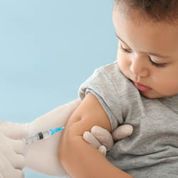CHDS Post-Doctoral Fellow Allison Portnoy and Faculty Stéphane Verguet with others published an article in Value in Health about the two main delivery platforms of the measles vaccine: routine immunization or supplementary immunization activities.
“Across 20 low- and middle-income countries, we found that supplementary immunization activities resulted in more equitable delivery across different socioeconomic groups about 65% of the time,” commented Portnoy. These results can enable a better description of the real-world impact of different delivery platforms in reducing health inequalities and improving equity at the global and local levels and can highlight the important role that measles supplementary immunization activities can play in reaching children from poorer households.
“Supplementary immunization activities are vaccination campaigns that provide an additional vaccination opportunity to children of different ages regardless of their previous history of measles vaccination, complementing routine programs especially where health systems are weak and vaccination coverage is low,” said Verguet. “With equity considerations included in the estimation of public health impact, determining the appropriate mix of routine and supplementary immunization activity delivery necessary for measles control and elimination efforts can help achieve the necessary coverage levels for preventing measles cases and deaths and reach those levels equitably across socioeconomic groups.”
This research was supported by a grant from the Eunice Kennedy Shriver National Institute of Child Health & Human Development of the National Institutes of Health.
Learn more: Read the Value in Health article, Comparative Distributional Impact of Routine Immunization and Supplementary Immunization Activities in Delivery of Measles Vaccine in Low- and Middle-Income Countries
Learn more: Read the ISPOR press release about this article, Supplementary Measles Immunization Activities Provide More Equitable Results Than Routine Measles Immunization Programs
Learn more: Read the related Vaccine article, Impact of Measles Supplementary Immunization Activities on Reaching Children Missed by Routine Programs
Related news: Measles Study Presented at Vaccine Consortium
Related news: CHDS Faculty Member Finds Vaccination May Improve Health Equity
